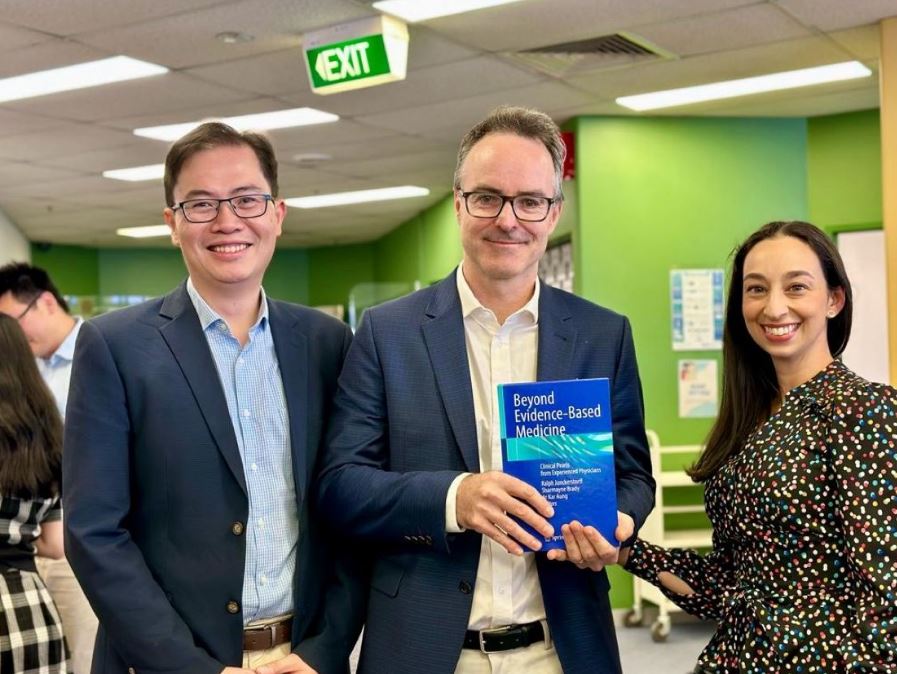Leadership Pearls in Healthcare
30 Sep 2025
Wisdom for the Next Generation of Leaders
Dr Ralph Junckerstorff’s new book, Leadership Pearls in Healthcare, offers a refreshing take on leadership in the health sector. Designed to be readable, practical, and approachable, rather than an exhaustive textbook it brings together the lived experiences of seasoned healthcare leaders and distils them into actionable insights.
These “pearls of wisdom” not only illuminate what leadership looks like in practice but also show that leaders come from diverse backgrounds. You don’t need to set out with leadership ambitions to ultimately become one sometimes it’s about recognising opportunities, developing self-awareness, and stepping into leadership when it matters most.By sharing stories, reflections, and frameworks, Leadership Pearls in Healthcare seeks to break down these barriers and dispel the “us vs them” stereotype, encouraging greater collaboration for the benefit of patients, teams, and systems.
We asked Dr Junckerstorff, along with co-editor and author of the introduction Sara Baqar, a few questions about the inspiration for the book, its central themes, and what healthcare leaders can take from it. Their responses provide a deeper glimpse into why self-awareness, emotional intelligence, resilience, and even the Japanese concept of ikigai are so critical in shaping modern healthcare leadership.
- What inspired the creation of Leadership Pearls in Healthcare, and what do you hope readers will take away from it?
I have always believed in the value of lived experience, and it is rare that this is able to be formally captured in the form of a book. The format used in Leadership Pearls in Healthcare stems from the original book I co-edited, which is a book of medical clinical pearls. I felt this format was well suited to leadership as in my opinion, leadership is more art than science.
This book was designed to be easily digestible and user-friendly, rather than an exhaustive textbook. I hope the book will be a valuable resource for those considering a leadership position and that readers will realise that anyone is capable of being a leader. It is something that can be learned and everyone has unique strengths and weaknesses.
- The book talks about the importance of self-awareness and career clarity as the foundation of leadership. Why are these inner qualities so critical in healthcare leadership?
Healthcare leadership is challenging. It is something that many healthcare practitioners are not familiar with and historically, it is something they have not been taught. Unfortunately, not all great clinicians turn out to be great leaders.
Having an understanding of who you are and where you’re going (both personally and professionally) is really important, as this allows you to focus on the team you lead. That said, leadership is an individual journey, so these two aspects are inextricably linked.
Self-awareness is one of the most practical skills a leader can develop. It helps you recognise your own triggers, limitations, and blind spots before they affect others. Career clarity then complements this by providing direction. When leaders know where they are heading and why, they can set priorities more effectively and lead with purpose.
Although self-awareness and career clarity are desirable, it is also important to note that there may not ever be a “perfect time” to step into healthcare leadership. Opportunities often arise unexpectedly, and being open to them may allow for significant career and personal development.
- Emotional intelligence and resilience come through as recurring themes. From your perspective, what do they look like in practice for health leaders under pressure?
In healthcare, pressure is constant no matter what role you’re in. For me, emotional intelligence is about how we respond in these situations. It means pausing to respond rather than rushing to react, noticing how the team is working, and adjusting communication to keep focus.
Resilience is what allows leaders to sustain themselves and their teams under ongoing demand. It’s about pacing yourself and the team, making sure everyone has time to recharge, and keeping perspective so competing pressures don’t take over.
Mindfulness links the two. I practice mindfulness in simple ways such as taking a few deep breaths or stepping away for a cup of tea between meetings. These small resets help me return with clarity, pay full attention, and make more effective decisions.
Together, emotional intelligence, resilience, and mindfulness provide the stability and direction leaders need to keep teams moving forward under pressure.
At HG, we see a strong connection between the skills explored in Leadership Pearls in Healthcare and the growth experienced through our Executive Learning Sets and HG’s development programs.
These programs provide a trusted, collaborative environment where leaders can strengthen self-awareness, practise resilience, and refine the very qualities that the book highlights as essential for navigating the complex world of healthcare leadership. If you’re interested in developing these skills further, explore our Executive Learning Sets and leadership programs to find the right pathway for you.
If you’re interested in diving deeper into Leadership Pearls in Healthcare, a special discount code is available for purchases here. The book is also accessible through select institutions, including universities.


